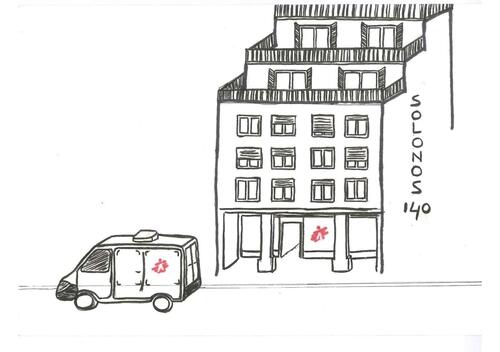After nearly a decade of offering vital medical, psychosocial, and social-legal support to migrants, asylum seekers, and refugees in Greece, Médecins Sans Frontières (MSF) closed our day care centre in Athens on 30 May 2025.
The centre was opened in 2015 to respond to people’s urgent humanitarian needs during the peak of the EU migration crisis, as over one million people arrived in Greece seeking refuge from conflict, persecution, and instability. Since its inception, MSF’s multidisciplinary team —including medical staff, legal experts, and social workers —have provided free, comprehensive, and inclusive care regardless of patients’ legal status. We offered services ranging from essential healthcare and sexual and reproductive health services to mental health support, chronic disease management, and legal and social assistance.
Over nine years, the day centre provided more than 14,900 consultations, including for non-communicable diseases, 51,859 sexual and reproductive health services consultations, and 24,475 mental health sessions. We also supported 1,289 survivors of sexual violence and provided 3,026 social work consultations that addressed people’s immediate medical needs and long-term wellbeing.
At the peak in 2016, Athens received thousands of new arrivals fleeing conflict. While annual arrivals remain significant, at around 50,000 to 60,000, they no longer reflect the crisis levels of that year.
Over the years, the centre evolved to meet the changing realities of migration in Greece, expanding services and intensifying advocacy efforts as access to healthcare became increasingly restricted by policy changes. During moments of crisis—from the 2016 EU-Türkiye deal to the COVID-19 pandemic—MSF adapted to protect and treat the most vulnerable, including people excluded from the health system, survivors of sexual violence, and undocumented individuals.
Having fulfilled our emergency response in Athens and extending beyond what was planned, MSF has now closed the day care centre in line with our medical-humanitarian role, guided by needs assessments and focused on urgent, time-bound interventions. We now encourage civil society and national actors to take over and continue this vital work, even as global challenges—including reduced humanitarian funding—continue to affect people on the move.
Over nine years, MSF built more than a healthcare unit to provide free comprehensive medical services — we built a response that adapted to real human needs.Christina Psarra, General Director of MSF in Greece
MSF urges the Greek government and the EU to respect their legal and humanitarian obligations for the protection of asylum seekers, recognised refugees and migrants, especially regarding the right to asylum, access to healthcare, decent reception and living conditions and fair administrative procedures.
While we have transitioned medical services to some local actors, donated stocks of essential medicines to social pharmacies, and nonprofits, and handed over responsibilities to partners in Athens, we remain active in Greece with medical projects in Samos, Lesbos, and Leros. As a medical emergency organisation, MSF stands ready to respond to future crises and continuously assesses services to better support people.
“Over nine years, MSF built more than a healthcare unit to provide free comprehensive medical services — we built a response that adapted to real human needs. When people couldn’t access care due to legal or social barriers, we expanded our services, advocated for their rights, and stood by them through every crisis,” says Christina Psarra, General Director of MSF in Greece.
“When doors to the health system were closed, we worked to open others. This was never just a healthcare centre, it was a lifeline,” says Psarra.



